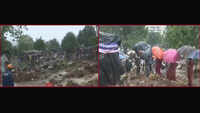
NEW DELHI: National Commission for Scheduled Tribes (NCST) will hold a meeting on Tuesday with Union home and tribal affairs minister on the displacement of tribals from Chhattisgarh due to Naxalite violence and their return and rehabilitation in the state.
The TOI was the first to report on May 15 this year that the Union tribal affairs ministry will conduct a survey and identification of the tribals who moved from Chhattisgarh to Andhra Pradesh in the wake of the rise in Maoist violence 15 years ago.
The NCST has sent letters to Union home and tribal affairs ministries and the governments of Chhattisgarh, Andhra Pradesh, Telangana, Odisha and Maharashtra, asking for a report on the living conditions of the internally displaced tribals. The Commission has also asked the representatives of the five states to attend the meeting scheduled for Tuesday in New Delhi.
The meeting has been called by the NCST on the basis of the initiatives of a peace activist Shubhranshu Choudhary who runs an NGO, CGNet Swara Foundation, based in Raipur. Choudhary has been working with and for the welfare of the Internally Displaced People from Chhattisgarh.
As per CGNet Swara Foundation thousands of tribals from the Bastar region, were displaced due to the Maoist violence and the subsequent state-backed counter-Maoist campaign Salwa Judum, beginning 2005. Until now, there has been no institutional identification and registration of the displaced tribals. Though the NHRC has estimated that around 15,000 people were uprooted, civil society groups claim that the number is several times higher. Incidentally, 40 villages of the undivided Dantewada district of Chhattisgarh were not counted in the 2011 Census.
"Official reports tried to suppress the humanitarian crisis of IDPs by terming it a group of habitual, seasonal migrant farm labourers who chose to stay on. No agency competent to conduct anthropological study as per established methodological norms of social sciences was ever commissioned by any government to obtain verified data, let aside making of any proper rehabilitation of these IDPs," Choudhary told the TOI.
The displaced tribals, Choudhary said, are living in miserable conditions without any access to drinking water and electricity. Most of them don't have any identity cards, ration cards, health insurance etc. They have no right over forest land of the host states which refuse to recognize them as native triabls. They remain excluded from all social security benefits and as a result, most of them want to return and resettle in their native places, Choudhary added.
The NCST in its letter to the state governments has asked them to submit their respective reports about the displaced tribals by July 1. The meetings with the home ministry and the tribal affairs ministry tomorrow will also discuss how the displaced tribals have been denied both the individual and the community forest rights both at their permanent place and their temporary residence.
The TOI was the first to report on May 15 this year that the Union tribal affairs ministry will conduct a survey and identification of the tribals who moved from Chhattisgarh to Andhra Pradesh in the wake of the rise in Maoist violence 15 years ago.
The NCST has sent letters to Union home and tribal affairs ministries and the governments of Chhattisgarh, Andhra Pradesh, Telangana, Odisha and Maharashtra, asking for a report on the living conditions of the internally displaced tribals. The Commission has also asked the representatives of the five states to attend the meeting scheduled for Tuesday in New Delhi.
The meeting has been called by the NCST on the basis of the initiatives of a peace activist Shubhranshu Choudhary who runs an NGO, CGNet Swara Foundation, based in Raipur. Choudhary has been working with and for the welfare of the Internally Displaced People from Chhattisgarh.
As per CGNet Swara Foundation thousands of tribals from the Bastar region, were displaced due to the Maoist violence and the subsequent state-backed counter-Maoist campaign Salwa Judum, beginning 2005. Until now, there has been no institutional identification and registration of the displaced tribals. Though the NHRC has estimated that around 15,000 people were uprooted, civil society groups claim that the number is several times higher. Incidentally, 40 villages of the undivided Dantewada district of Chhattisgarh were not counted in the 2011 Census.
"Official reports tried to suppress the humanitarian crisis of IDPs by terming it a group of habitual, seasonal migrant farm labourers who chose to stay on. No agency competent to conduct anthropological study as per established methodological norms of social sciences was ever commissioned by any government to obtain verified data, let aside making of any proper rehabilitation of these IDPs," Choudhary told the TOI.
The displaced tribals, Choudhary said, are living in miserable conditions without any access to drinking water and electricity. Most of them don't have any identity cards, ration cards, health insurance etc. They have no right over forest land of the host states which refuse to recognize them as native triabls. They remain excluded from all social security benefits and as a result, most of them want to return and resettle in their native places, Choudhary added.
The NCST in its letter to the state governments has asked them to submit their respective reports about the displaced tribals by July 1. The meetings with the home ministry and the tribal affairs ministry tomorrow will also discuss how the displaced tribals have been denied both the individual and the community forest rights both at their permanent place and their temporary residence.
Download The Times of India News App for Latest India News.
more from times of india news
World Cup 2019
Trending Topics
LATEST VIDEOS
More from TOI
Navbharat Times
Featured Today in Travel
Quick Links
Rajasthan election 2019Andhra Lok Sabha electionGujarat Election 2019Karnataka Election 2019MP Lok Sabha electionMaharashtra election 2019West Bengal Lok SabhaTamil Nadu election 2019UP Election 2019Bihar election 2019UP Election DateAndhra Election DateBihar Election DateAndhra Assembly ElectionLok SabhaMP Election DateMaharashtra Election DateShiv SenaYSRCPTDPWB Election DateJDUCongressBJP newsGujarat Election DateSC ST ActUIDAIIndian ArmyISRO newsSupreme CourtRajasthan Election DateTelangana Election DateTamilrockers 2018Uttarakhand newsSikkim newsOrrisa newsKarnataka Election DateNagaland newsSatta KingManipur newsMeghalaya news
Get the app









